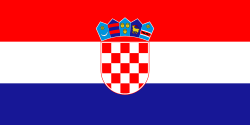 |
| Croatia results |
This is a list of the Croatia national football team results from 1940 in Yugoslavia up to the country's independence in 1991.
Contents
- Key
- 1940s–1950s
- 1940: Banovina of Croatia
- 1941: Independent State of Croatia
- 1942: Croatia
- 1943: Independent State of Croatia
- 1944: Independent State of Croatia
- 1945: Federal State of Croatia
- 1956: Socialist Republic of Croatia
- 1990s
- 1990: Republic of Croatia
- 1991: Republic of Croatia
- Record per opponent
- External links
The 1940s matches include four played by the Banovina of Croatia and another fifteen by the Independent State of Croatia. Then, the Socialist Republic of Croatia played a 1956 match against Indonesia.
In the modern era, the nation played three friendly matches under its new name, the Republic of Croatia, shortly before its independence from Yugoslavia, the first being against the United States in 1990.